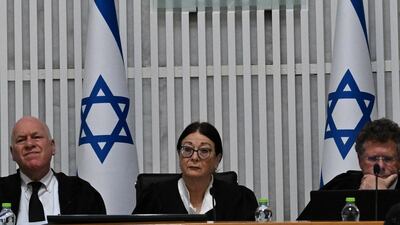People across Israel were on tenterhooks on Tuesday as the country’s most senior judges deliberated on whether to overturn a key aspect of the government’s proposed judicial reforms – a decision that could lead to a constitutional crisis.
In one of Israel’s most politically divisive days this year, government ministers lambasted the opposition and legal officials, while opposition politicians slammed the government for being unpatriotic.
In Tel Aviv, the Museum of Art cancelled entry fees and screened the proceedings so that the public could watch the “decisive moment”.
The High Court hearing relates to government-enacted legislation passed in July to revoke a “reasonableness standard”, which gives judges the power to overturn government policies on the basis of their being unreasonable.
If the High Court overturns the legislation and the government ignores that decision, civil servants and security chiefs will have to decide whether to act in accordance with the government or the judiciary’s stance, which could lead to a constitutional crisis.

Opponents of Prime Minister Benjamin Netanyahu’s plans to drastically weaken the judiciary say that democracy in the country could end if the courts – and a vast anti-government protest movement – cannot halt the process.
Protests against the judicial overhaul began in January and have continued ever since, becoming the largest street demonstrations in Israel's history.
Government supporters say judicial reform is needed to rein in an excessively powerful and anti-democratic judiciary.
Before the fraught session even began in the High Court on Tuesday morning, Justice Minister Yariv Levin, a key architect of the reforms, said the fact that such a hearing was taking place was a “mortal blow to democracy and the status of the Knesset [Israel’s parliament]”.
Mr Levin, of Mr Netanyahu’s Likud party, has consistently taken a hard line on the reforms and pressured the Prime Minister against watering down the plans to seek an agreement with the opposition.
Far-right politician and long-time advocate of reform Simcha Rothman was in attendance to slam the Supreme Court as an “oligarchic regime”.
In a sign of the case’s significance, all 15 justices are hearing the appeal together for the first time in the country’s history, rather than in typical smaller panels. The proceedings were also live-streamed and aired on the country's main TV stations.

A key issue in the proceedings was whether the judiciary has the power to interfere with government attempts to change quasi-constitutional “Basic Laws”, of which the reasonableness standard is one.
If the court rules in favour of petitioners challenging the government’s law, it will be the first time such a foundational law is disqualified.
Despite harsh questioning from some of the justices, viewed by some as a sign the court will eventually rule against the government, Chief Justice Esther Hayut stressed that her court could only quash a Basic Law if it were to be a “mortal blow” to democracy.
There is no exact date when the court will issue its final ruling, although the result is likely to come within weeks, if not months.


